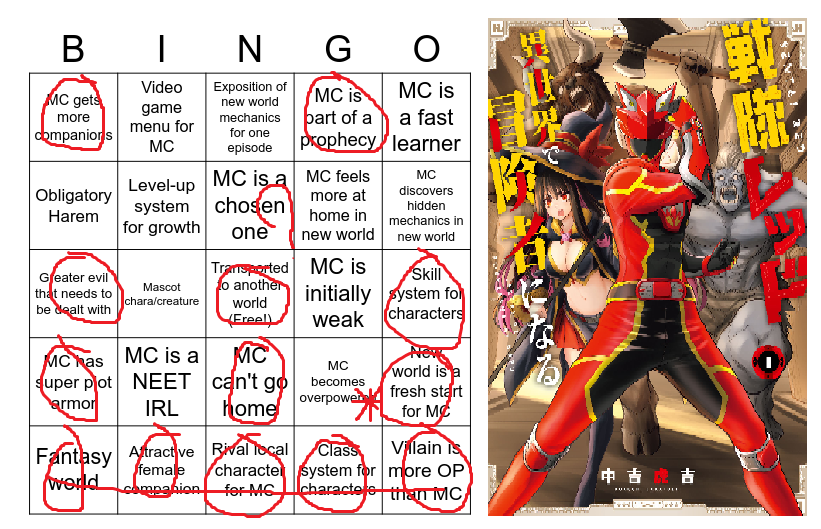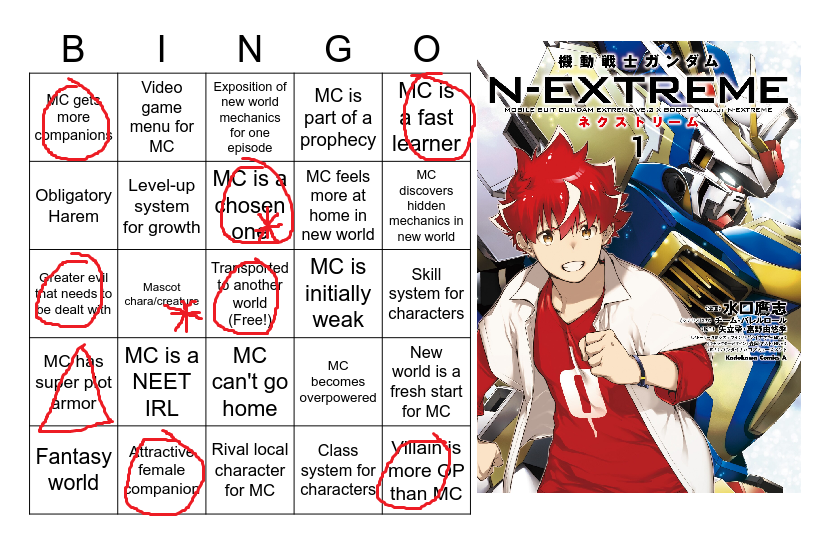I forgot to respond lol. Thanks to Beep for reminding me about this god-forsaken thread
If you don't like power fantasy - don't write power fantasy. If you don't like slice-of-life, don't write slice of life. Don't demand that all power fantasy works suddenly stop being themselves.
This neatly summarizes the entirety of your points. I am
not demanding that all subgenre stop doing whatever they want. I am pointing out that many works contain tropes. No, I don't think about this everytime I watch Isekai. It's just in a thread titled "The elephant in the room in another world: Analyzing Isekai Tropes and how to Deconstruct them", I found it exigent to deconstruct those tropes.
Isekai works can do what they want; they can tell whatever story they want; they can have whatever world they want. But if you were to turn your brain on for than more than 5 seconds, then you would realize that many of these works had
similarities that kept cropping up. Perhaps, if you will, tropes. This is not necessarily bad or evident of poor writing. It's just that when every work starts having these parallels, it comes off as a tad uncreative. And the viewer must consider if there's any alternative to those correlative story elements. And those alternatives could be discussed and assessed in many places, such as a thread titled "The elephant in the room in another world: Analyzing Isekai Tropes and how to Deconstruct them".
For a long time, Magical Girl works were mostly the same: they were all happy-go-lucky with little existential threats and the adorable little magical animal mascot. If your arguments were to be transcribed to this, you would be arguing that that is a perfectly acceptable state; that that is what authors intended for and was realistic. And that's fair, there were no inherent problems in the worlds of those works and they had carried a message that the authors wanted to convey. However, it is undeniable that those were tropes. Then,
Puella Magi Madoka Magica was released, and it told a magical girl story with a completely different tone and style. It divulged from the overused path of previous works while not debasing the value of them, instead acting as a new way the genre could be told. That is what needs to happen to Isekai. It needs to evolve lest it become more stale than it already is (Ironically,
Madoka Magica isn't even a deconstruction, more of a reinterpretation).
In case you haven't noticed, the title of this thread is "The elephant in the room in another world: Analyzing Isekai Tropes and how to Deconstruct them". Did you catch the key word? "Deconstruct". It is not asking for a general defense of Isekai tropes. It is not asking for justifications of these tropes and why they make perfect sense. It's asking for critical thought to placed on these tropes -- thought into how these stories can be made unique, idiosyncratic, and not rely on decade-old premises. This is not done out of spite, it can be done out of a whole-hearted desire to improve the genre and to see it grow. For the last few months, you have been on a metaphorical
Titanic, bucketing out water and going 'this is fine' in your complete refusal to acknowledge any problem whatsoever. You can make bingo cards out of how many tropes are in modern isekai. Here's a few:
Pick any recent isekai (I recommend the hot garbage that is
A Playthrough of a Certain Dude's VRMMO Life". Very creative title right there), and watch the bingos flow in. That's not to say these works are bad (though the one I cited is totally mid), it's just as a fantasy work there isn't much fantasizing going on in the author. You don't need to defend these tropes, a good written work can use these tropes effectively. One such work is
The Eminence in Shadow, which is abundant in tropes yet plays off them creatively to be original. So please, stop. Stop trying to say how a trope makes sense in-universe, that they're realistic, that that's what authors wanted, that that's what's profitable, that I'm a buzzkill, that there's no problem at all. You are fundamentally misunderstanding what the elephant in the room is and what a deconstruction is. The elephant, is that these tropes are overused to high hell. Not that these tropes necessarily make no sense, but that their usage indicates that the genre has become stagnate, so popular that innovation has gotten stuck in a deadlock.
To quote OP, "this thread is for Collecting Tropes you find issue with, Brainstorming ideas of how to potentially deconstruct these tropes and
get some cool concepts out." If my language wasn't enough of an indicator, I am sick and tired of you stifling that last portion by never giving an
inch to any potential alternative. Though it seems the more mature Beep is managing to get your brain gears turning a bit (though I haven't bothered to take the 10 minutes to read through the posts made since my last reply).





